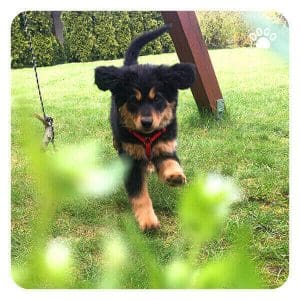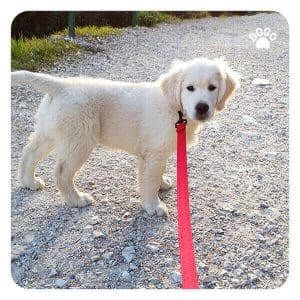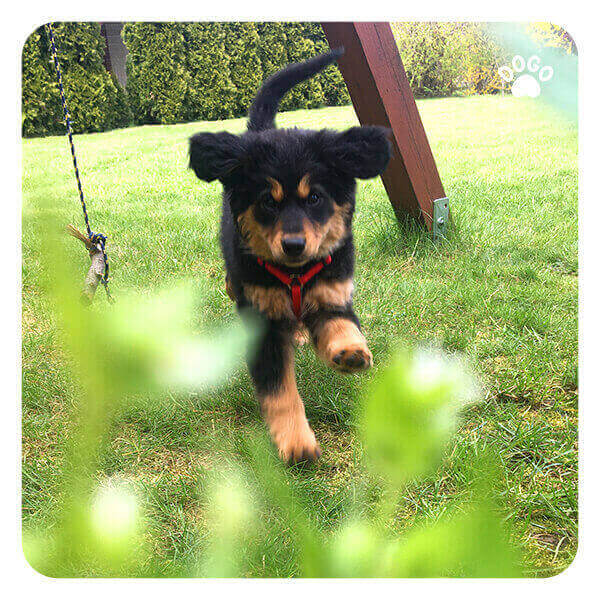 Whether it’s been planned for several months or you fell in love with seeing cute little eyes in pictures, adopting a new puppy is always an exhausting experience. A lot of happiness comes out of this adventure, but a lot of exasperation too and it is normal to feel a bit overwhelmed. We all do our best to remember that these little dogs don’t yet know anything about living with humans and that they have everything to learn, but my God, it would be easier if they spoke English!!! After having put in several weeks of effort, it’s normal to ask the question: when will it get easier? I will answer by talking about the different characteristics of puppies depending on their life stages. However, raising a puppy depends also on genetics, breed, size, the training you give it, and what experiences the dog will have.
Whether it’s been planned for several months or you fell in love with seeing cute little eyes in pictures, adopting a new puppy is always an exhausting experience. A lot of happiness comes out of this adventure, but a lot of exasperation too and it is normal to feel a bit overwhelmed. We all do our best to remember that these little dogs don’t yet know anything about living with humans and that they have everything to learn, but my God, it would be easier if they spoke English!!! After having put in several weeks of effort, it’s normal to ask the question: when will it get easier? I will answer by talking about the different characteristics of puppies depending on their life stages. However, raising a puppy depends also on genetics, breed, size, the training you give it, and what experiences the dog will have.
Phase 1 – A Little Demon
Puppies leave the breeder usually between 8 and 12 weeks old and this falls right during the socialization period. It is during this time that the puppy learns that they are a dog and they develop skills to communicate with their own, but also to like (or fear) other species, such as humans. It is therefore a crucial period when we must give them great positive experiences.
 It is also a difficult period in terms of nibbling in the first weeks. A puppy discovers everything through their mouth, it calms down a few weeks later, and then, around 4-5 months of age, the teeth start to fall out and the new growing teeth can hurt! It is therefore common to see some behaviors return such as biting. That’s why it’s important to satisfy their need to chew by giving your puppy enough chewing activities during the first weeks with you (and even after!).
It is also a difficult period in terms of nibbling in the first weeks. A puppy discovers everything through their mouth, it calms down a few weeks later, and then, around 4-5 months of age, the teeth start to fall out and the new growing teeth can hurt! It is therefore common to see some behaviors return such as biting. That’s why it’s important to satisfy their need to chew by giving your puppy enough chewing activities during the first weeks with you (and even after!).
The first two months demand a lot on an emotional level because you have to manage the environment to avoid mess, train the basic commands to your puppy (using the Dogo app), offer them good socialization experiences, and meet their chewing needs. It often seems like an endless whirlwind, but believe me, it’s temporary!
Phase 2 – A Little Angel
You are a bit dizzy by this little tornado puppy of 4-5 months of age and suddenly, you realize that your efforts are starting to pay off: less biting and destruction, more listening and the puppy seems well adapted to your routine. You enjoy a little respite that I call “the angelic period” when you can breathe a little again. Unfortunately, not all puppies experience this period and the duration is shorter or longer depending on the individual.
During this phase, owners might also notice that their puppy is more willing to explore new environments or that they are more interested in meeting new people. Puppies might also become more receptive to training and obedience commands during this period. Overall, the Little Angel phase is a time when owners can begin to see the fruits of their labor and enjoy a more harmonious relationship with their furry friend.
 If you are lucky enough to have this quiet moment, take the opportunity to practice behaviors that will come in handy when you reach their teenage years, such as recall, walking on a leash, and impulse control. You have a whole series of step-by-step exercises in the Dogo app’s “New dog” training program. Finally, you should continue to make all the experiences as positive as possible during this period, because fears can easily remain anchored in your pup’s little brain.
If you are lucky enough to have this quiet moment, take the opportunity to practice behaviors that will come in handy when you reach their teenage years, such as recall, walking on a leash, and impulse control. You have a whole series of step-by-step exercises in the Dogo app’s “New dog” training program. Finally, you should continue to make all the experiences as positive as possible during this period, because fears can easily remain anchored in your pup’s little brain.
Phase 3 – A Hormonal Teenager
Depending on the breed and development of your puppy, this period can happen as early as 5 months and as late as a year. This is when your dog’s hormones start to develop. The spirit of discovery takes over and the smells in the environment become a lot more interesting than you. This is also when the dog begins to assert himself a little more with their peers and humans. In this stage, you will notice a full range of their personality traits and their unlimited energy. Many will tend to increase the dog’s level of physical activity to spend this energy, which is part of the solution, but I advise you to also bet on calm, self-control, and focus during this period. You can find more details on how to do so in this article. It is important to be supportive and to understand all the changes that your puppy goes through in their first year of life. Nevertheless, it is crucial not to let their education go by saying to yourself that “it will pass with time ”. Some behaviors are temporary but others will stick around for a long time and will be more difficult to work on in the future. So now is the right moment to put in some effort!
Phase 4 – A Young Adult
 It is this phase that signals the beginning of the end. It gives a taste of what kind of dog you will have with you for many years to come. Now is the time to focus on their training, to find activities they enjoy. Why not sign them up for dog sports? Your puppy is finally physically grown and all the time you put into obedience during the first few months will allow you to take their education a little further. Enjoy!
It is this phase that signals the beginning of the end. It gives a taste of what kind of dog you will have with you for many years to come. Now is the time to focus on their training, to find activities they enjoy. Why not sign them up for dog sports? Your puppy is finally physically grown and all the time you put into obedience during the first few months will allow you to take their education a little further. Enjoy!
In Conclusion
To make the most of this period, owners should focus on building a strong foundation of obedience and positive reinforcement training. This can include using treats and rewards to reinforce good behavior, as well as spending time each day working on basic obedience commands. Additionally, owners should make an effort to socialize their puppy with other dogs and animals, as well as expose them to a variety of environments and experiences.
So when will it get easier? The first two months are the most difficult and the following months also bring their challenges. So the answer is, it will get easier and easier, depending on how much effort you put into educating your dog. You should therefore remain hopeful in the process during the first year. It’s several months of intense work that will give you many years of wonderful companionship with your dog. This is why adopting a puppy is not a decision to be taken recklessly. Make sure you are ready to invest your time and energy into the challenges that being a pet parent brings. Still, I fully recommend it to anyone willing to put in the effort. You won’t regret it once you have a perfect little family dog by your side.
[/fusion_text]



